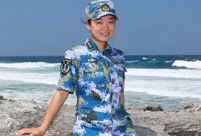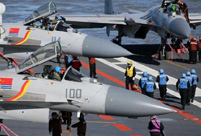

BEIJING, Jan. 24 -- Chinese President Xi Jinpingreturned home Sunday after wrapping up a historic trip to Saudi Arabia, Egyptand Iranwith a broad consensus and 52 cooperation agreements set to deepen Beijing's constructive engagement with the struggling yet promising region.
The fruitful five-day Middle East tour, which filled up Xi's global footprint, has once again testified to the Asian giant's commitment to promoting peace and development around the world and building a new type of international relations featuring win-win cooperation.
UPGRADE POLITICAL TIES
The visit, summarized Chinese Foreign Minister Wang Yi on Saturday, was a successful stroke of diplomacy that deepened China's traditional friendship and practical cooperation with the three countries and the region as a whole, and contributed to regional reconciliation, peace and development.
During Xi's trip, China upgraded its relationship with both Saudi Arabia and Iran to a comprehensive strategic partnership, and vowed to work together with Egypt to add more values to their comprehensive strategic partnership.
Regional organizations, including the Organization of Islamic Cooperation (OIC), the Cooperation Council for the Arab States of the Gulf (GCC) and the Arab League(AL), also applauded Xi's visit and voiced their readiness to cement mutual trust and broaden win-win cooperation with China.
AL Secretary General Nabil al-Arabi said China has always stood with the developing world, adding that the Arab world is willing to work closely with China in political, economic as well as other sectors for mutual benefit.
BOOST WIN-WIN COOPERATION
The Belt and Road Initiative, an ambitious vision Xi put forward in 2013 to boost inter-connectivity and common development along the ancient land and maritime Silk Roads, has gained more support and popularity during Xi's trip.
Saudi Arabia, Egypt and Iran, given their unique geographical locations and rich historical connections with China, are natural partners of China in jointly carrying out the initiative, noted the Chinese foreign minister.
Xi and leaders of the three nations agreed to align their countries' development blueprints and pursue mutually beneficial cooperation under the framework of the Belt and Road Initiative, which comprises the Silk Road Economic Belt and the 21st Century Maritime Silk Road.
The initiative, reiterated the Chinese president, is by no means China's solo, but a symphony of all countries along the routes, including half of the OIC members.
During Xi's stay in Saudi Arabia, China and the GCC resumed their free trade talks and "substantively concluded in principle the negotiations on trade in goods." A comprehensive deal will be made within this year.
Many observers have pointed out that the spirit of the Silk Road, which features peace and cooperation, conforms to the Islamic values, and China's efforts in the region show that China is far more than just an oil buyer.
What China is doing, they say, serves as a true paradigm of win-win cooperation and will help Middle Eastern countries improve their ability to grow independently.
PROMOTE MUTUAL LEARNING
Xi's trip, said Wang, also contributed to the time-honored exchanges between the ancient Chinese and Islamic civilizations and consolidated mutual understanding between the Chinese and Middle Eastern people.
The interaction and mutual learning between the Chinese and Islamic civilizations are an important part in the history of inter-civilization exchanges, Xi said in a signed article published on Saudi newspaper Alriyadh.
During his visit, Xi called for joint efforts to reject extremist thoughts and oppose tying terrorism with any specific nation, religion or religious sect.
Speaking of Xi's speech at the AL headquarters, Wang said the "China solution" proposed by the Chinese president, which takes peace and development as the core, targets both the symptoms and root causes of the Middle East quagmire.
In his address, Xi urged Middle Eastern countries to resolve their differences through dialogue and tackle the regional predicament through development.
Wang noted that China's diplomatic principles such as respect for sovereignty and non-interference have won unanimous appreciation across the region.
Beijing's basic stances of addressing conflicts via political means and letting the UN play a bigger role have also been widely recognized by regional countries, he added.
 A foreign girl explains what China should be proud of
A foreign girl explains what China should be proud of Chinese navy's air-cushioned landing craft in pictures
Chinese navy's air-cushioned landing craft in pictures Chinese pole dancing master opens class in Tianjin
Chinese pole dancing master opens class in Tianjin PLA holds joint air-ground military drill
PLA holds joint air-ground military drill Charming female soldiers on Xisha Islands
Charming female soldiers on Xisha Islands Beautiful skiers wear shorts in snow
Beautiful skiers wear shorts in snow Getting close to the crew on China's aircraft carrier
Getting close to the crew on China's aircraft carrier Chinese stewardess celebrate test flight at Nansha Islands
Chinese stewardess celebrate test flight at Nansha Islands Pentagonal Mart becomes the largest vacant building in Shanghai
Pentagonal Mart becomes the largest vacant building in Shanghai Top 20 hottest women in the world in 2014
Top 20 hottest women in the world in 2014 Top 10 hardest languages to learn
Top 10 hardest languages to learn 10 Chinese female stars with most beautiful faces
10 Chinese female stars with most beautiful faces China’s Top 10 Unique Bridges, Highways and Roads
China’s Top 10 Unique Bridges, Highways and Roads Virtual reality takes porn ‘to the next level’
Virtual reality takes porn ‘to the next level’ Online spat won’t hinder cross-Straits ties
Online spat won’t hinder cross-Straits ties A look behind the scenes at China’s censorship watchdog
A look behind the scenes at China’s censorship watchdog $93m gay app deal raises questions over future of LGBT services
$93m gay app deal raises questions over future of LGBT servicesDay|Week